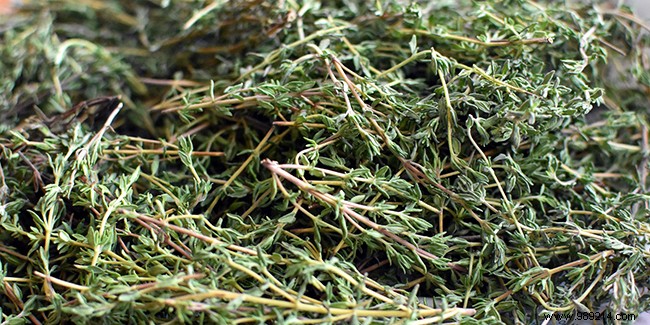
There are about 300 varieties of thyme . The most used is the common thyme . This aromatic plant grows in the south of France in the wild in the scrubland. It is used to enhance many dishes in the kitchen, but it also has medicinal properties helping to relieve intestinal, digestive and respiratory ailments. Common thyme is also an anti-infective and stimulates the immune system.
Thyme is part of the Lamiaceae family. It is found in the form of essential oils, syrup, infusion or tincture. Common thyme was used around 5,000 BC. It was used to embalm the dead in Egypt. In ancient Greece, it was used to purify the air. In the Middle Ages, it was used to fight against the great scourges, in particular against leprosy and the plague. From the 16th century, thyme entered apothecary shops and was used for many ailments .
Common thyme grows around the Mediterranean Basin on the form of a shrub with sessile leaves and quadrangular stems. Its size does not exceed about thirty centimeters in general. The small pink flowers and in spikes, open between the months of June and October. Thyme grows between rocks, in the sun and requires very little water. It can be found up to 1,500 meters above sea level and is harvested in August and September.
In phytotherapy , we use the leaves and flowers of thyme when they are dry. Thyme contains many components such as:
The way to use thyme is infusion which can be taken up to three times a day. This infusion is prepared using a few grams of dried plant that is put in boiling water for ten minutes before filtering and then consuming it. The infusions are mainly used for angina, rhinitis, sore throat, cough or cold.
If a condition is severe enough, you should consult your doctor, but in addition to medical treatment, it is possible to use essential oil of thyme applied externally to the area to be treated. Ask your doctor whether to dilute it or not. Per os, do not exceed 5 drops per day. If thyme is taken as a syrup , it is possible to use one spoon three times a day.
Thyme helps relieve certain respiratory pathologies . It is also an antiseptic and antifungal helping to reduce nasal secretions, prevent dental caries, relieve toothache, bad breath when used as a mouthwash. Common thyme also helps to relieve diarrhea, bloating, colopathies, etc. Used in external care, thyme helps treat wounds, scabies, herpes, fungal infections, and even shingles. It has also been noticed beneficial effects of thyme on rheumatism or osteoarthritis.
Thyme is very low allergen , so it is easy to use in herbal medicine. If it is in the form of an essential oil, it must be a specialist who indicates the dosage. Thyme has been reported to be an abortifacient and emmenagogue due to thymol that it contains. Used in essential oil, so be careful when a pregnant woman uses it.
Thyme contains vitamin K participating in the blood clotting process. People on anticoagulant therapy should therefore be careful to take small amounts of thyme. Its use is also not recommended for pregnant women.
When thyme is used in essential oil in too weak a dilution, it can be irritating if it comes into contact with a fragile mucous membrane. It is also not recommended for people taking a treatment antihypertensive . To date, there are no known interactions with drugs and other medicinal plants.
Many scientific studies have been conducted on the anti-infective effects of thyme, its essential oil, tincture and infusion. In 2007, it was demonstrated that an aqueous extract of thyme could reduce the adhesion of a bacterium in the oral cavity. Another study showed that thyme had antibacterial effects on staphylococci and streptococci as well as on a fungus. This same study reports that thyme has a real anti-inflammatory effect. . Many other studies have also been successfully conducted to fight against herpes , on symptoms of bronchitis rapidly improving and many more.
People wishing to treat themselves with thyme can combine it with oregano, cinnamon or cloves, especially to prevent the flu. Combined with ginger or turmeric, thyme is effective in strengthening the immune system. In all cases, it is necessary to ask the advice of your doctor especially if some symptoms last beyond three days.